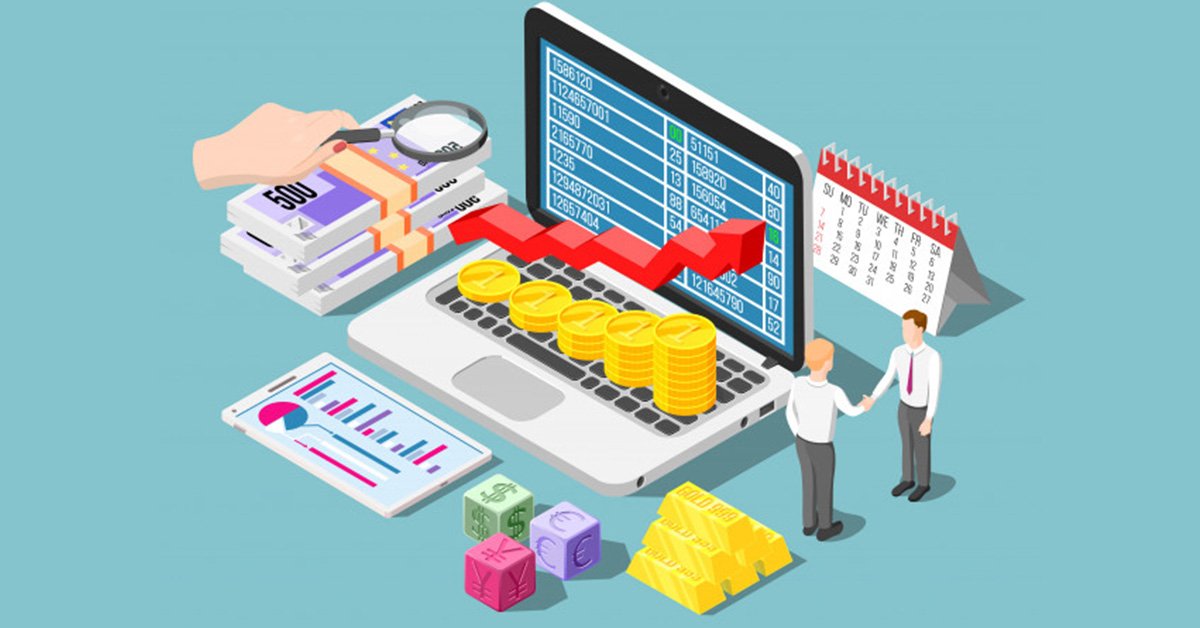How to Invest in Stock Market
Investing in the stock market is a long-term strategy that can help you manage your finances. Investing in the stock market can be daunting, especially if you’re just getting started, because it appears very complicated or risky. A thorough understanding will assist you in getting started.
The chance of more significant returns on your investment and the development of financial discipline are two of the top reasons to invest in the stock market.
For example, has produced a greater rate of return over the last decade when compared to actual saving products such as fixed deposits. Periodic investments encourage you to save money and invest it wisely, instilling a financial discipline habit.
What is Stock Market
A stock market is a location where financial instruments, such as stocks, bonds, and commodities, are traded.
The National Stock Exchange (NSE) and the Bombay Stock Exchange are India’s two leading stock exchanges (BSE). The NSE is the largest, accounting for over 90% of all-cash deals. There are also additional commodity exchanges, such as the Multi Commodity Exchange (MCX) and the Indian Energy Exchange (IEX), which trade power and other commodities.
The Securities and Exchange Board of India (SEBI) regulates all stock market activities and participants, including day-to-day trading, traded instruments, and exchanges that allow financial instruments to be sold.
These exchanges also handle indexes in addition to listing companies. A stock index is a collection of companies representing a specific subject, such as size or industry. It also provides investors with a standard indicator of the stock market’s trend.
The NIFTY and SENSEX are the most widely used indices in India. NIFTY is a market capitalization-weighted index of the top 50 stocks listed on the NSE. The SENSEX is a similar index that includes 30 BSE-listed firms.
The performance of fund managers and other equities is frequently measured using stock market indices. For example, if a mutual fund that benchmarks its performance to the NIFTY returned 10% this year, but the NIFTY returned 15%, it would have “underperformed” its benchmark. It suggests that instead of depending on the fund managers’ wisdom, you would have been better off just buying those 50 NIFTY equities.
How to Invest in Stock Market
On the stock market, you cannot purchase or sell directly. It would help if you went through a broker authorized to trade on the market or a stock brokerage firm that allows you to change on their platform. Check out the simple procedure given below:-
- You must first open a trading account with a broker or a stock brokerage platform to begin investing. You actually “trade” or put buy or sell orders in a trading account.
- Your broker or stock brokerage platform opens a Demat account for you.
- The financial securities in your name are held in a Demat account.
- After that, your bank account is linked to these two accounts.
- To open a trading or Demat account, you must present Know Your Customer (KYC) documentation, including verification using government-issued identity documents such as your PAN card or Aadhar card.
- Most brokers and brokerage platforms now feature an online KYC process that allows you to open an account in days by online providing your verification information.
- Once your account is established, you can trade with your broker or brokerage firm online through a portal or over the phone.

What Does Investing in the Stock Market Cost
There are a few different types of fees that you will normally have to pay:
Transaction Costs
A brokerage charge is paid to all brokers for facilitating a deal on your behalf. These prices are rapidly dropping as discount brokers emerge. They collect taxes and dues given to the government on each transaction, such as the Securities Transaction Tax (STT), SEBI charges, and the Goods and Services Tax (GST), among other things.
Demat Charges
Your broker or brokerage platform may open your Demat account on your behalf, but they do not manage it. To protect your interests, Demat accounts are managed by central securities depositories such as NSDL or CDSL, which the government regulates. To keep your account active, you must pay a small annual fee (usually collected by your broker or brokerage platform). These fees can cost anywhere from INR 100 to INR 750.
Taxes
Taxes are a percentage of your investment profit that you pay to the government. When it comes to stocks, you pay a long-term capital gains tax of 10% if you hold them for more than a year and short-term capital gains tax of 15% if you hold them for less than a year. These tax rates fluctuate based on the government’s levy of a cess or surcharge.
What Are the Different Types of Stocks
You’ll come across the word “market cap” when studying equities or mutual funds. The market cap, also known as market capitalization, is the total value of a corporation. If a company’s market valuation is INR 10,000 crore, that’s how much it would cost you to buy all of the company’s shares.
Three categories of stocks can be classified based on their market capitalization. This is crucial because many mutual funds and exchange-traded funds (ETFs) are categorized according to the market caps they target.
Large-Cap Stocks
SEBI defines large-caps as the top 100 stocks by market capitalization. These businesses are among the country’s largest in terms of revenue, well-established, and frequently market leaders in their fields. These are considered the safest investments, but they may not rise as quickly as mid- or small-cap equities. However, they may provide more enormous dividends and a secure capital reserve in the long run.
Mid Cap Stocks
SEBI defines mid-caps as stocks with a market capitalization of between 101 and 250 million rupees. It often refers to enterprises with a market capitalization ranging from INR 8,000 to INR 25,000 crore. These companies are smaller than large caps, have more robust growth potential, and can disrupt or grow into large caps. They are regarded as riskier than huge caps but safer than small caps.

Small Capital Stock
SEBI classifies all stocks in the top 251 by market capitalization as small caps. These are small-company stocks that are often quite volatile. These are considered riskier than the other two, but they have the potential for more significant profits. Small caps are also less “liquid,” meaning fewer buyers and sellers of these stocks than there are for large caps.
Aside from market capitalization, companies are classified by industry, dividend yield, and growth rate, among other factors.
In the Stock Market, What Can You Invest In
The following are some of the most commonly traded financial products on the stock exchange:
- Equity shares- Equity shares are issued by corporations and entitle you to a portion of the company’s profits in dividends.
- Bonds- Bonds, which firms and governments issue, are loans made by the investor to the issuer. These are issued at a set interest rate and for a set period. As a result, they’re also known as debt or fixed-income instruments.
- Mutual Funds (MFs)-MFs are vehicles for pooling money subsequently invested in various financial assets. They are issued and operated by financial institutions. The profits from the investments are divided among the investors by the number of units or investments they own. These are referred to as “actively” managed products, and they involve a fund manager making decisions on what to buy and sell on your behalf to outperform the benchmark (like the NIFTY).
- Exchange-Traded Funds(ETFs)-ETFs, which are becoming increasingly popular, track an index such as the NIFTY or the SENSEX. When you purchase a unit of the ETF, you are buying a portion of the NIFTY’s 50 stocks at the exact weighting as the NIFTY. These are referred to as “passive” products, often less expensive than mutual funds but provide the same risk and return profile as the index.
- Derivatives-The value of a derivative is determined by the performance of an underlying asset or asset class. Commodities, currencies, stocks, bonds, market indexes, and interest rates are examples of derivatives.
What Should You Buy, and How Should You Decide
Decide your Appetite for Risk
The amount of danger you can take depends on your risk appetite. The investment timeline, age, purpose, and capital are all elements that influence risk appetite. Another essential factor to consider is your current liabilities.
Regularly invest
You must set aside funds for regular investment now that you have a Demat account. Make a personal budget, keep track of your costs, and see how much money you can save. A Systematic Investment Plan is the most excellent way to invest in the market (SIP). A SIP is when you put the same amount of money in a mutual fund every month. This allows you to average the various market levels you enter, keep solid investing habits, and gradually increase your investments as your confidence grows.
Develop a Diversified Portfolio
Investing in a diversified variety of assets is the primary criterion for constructing any portfolio. This reduces the negative impact if a particular investment performs poorly. Diversification happens across asset classes, industries, and cycles. It’s tempting to put all your money into a drive on the rise. However, it is usually preferable to diversify across sectors, balancing market cap exposure and hedging the risk of equity shares with stable but lower-yielding bonds. Finally, take advantage of SIPs to ensure that you have invested in securities during various market cycles.
Rebalance your Investment Portfolio
As your goals shift over time, you’ll need to adjust your portfolio accordingly. Every few quarters, rebalance your portfolio to ensure you are not over or underexposed to any one stock or asset class. This becomes even more important as you get older and your priorities shift. When starting a family or approaching retirement age, you may want to reduce your risks.
How to Invest in Stock Market
Thank you very much for reading this article. If you need any information related to this article, you can tell us through the comment box. Do share this article with your friends or relatives. Thanks once again.
What is the Stock Market?
A stock market is a location where financial instruments, such as stocks, bonds, and commodities, are traded.
What Does Investing in the Stock Market Cost?
Transaction Costs
Demat Charges
Taxes.
What Are the Different Types of Stocks?
Large-Cap Stocks
Mid Cap Stocks
Small Capital Stock.
In the Stock Market, What Can You Invest In?
Equity shares
Bonds
Mutual Funds (MFs)
Exchange-Traded Funds(ETFs)
Derivatives.
What Should You Buy, and How Should You Decide?
Decide your Appetite for Risk
Regularly invest
Develop a Diversified Portfolio
Rebalance your Investment Portfolio.




